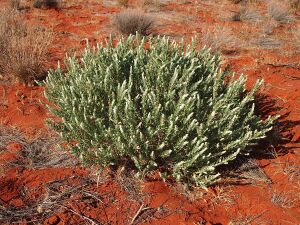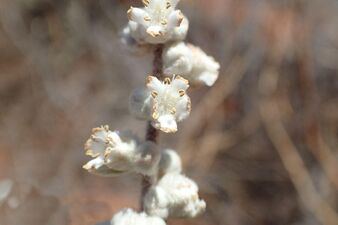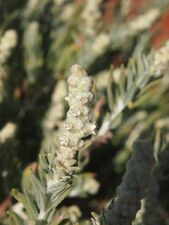Biology:Dicrastylis costelloi
| Dicrastylis costelloi | |
|---|---|
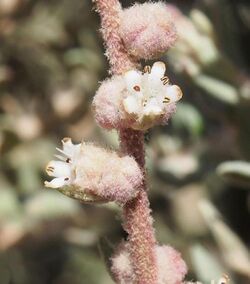
| |
| Scientific classification | |
| Kingdom: | Plantae |
| Clade: | Tracheophytes |
| Clade: | Angiosperms |
| Clade: | Eudicots |
| Clade: | Asterids |
| Order: | Lamiales |
| Family: | Lamiaceae |
| Genus: | Dicrastylis |
| Species: | D. costelloi
|
| Binomial name | |
| Dicrastylis costelloi | |
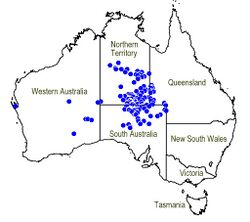
| |
| Synonyms[3] | |
|
Dicrastylis costelloi var. eriantha (F.Muell.) Munir | |
Dicrastylis costelloi is a species of plant within the genus, Dicrastylis, in the family Lamiaceae.[3] It is found in Western Australia, South Australia, the Northern Territory[3] and Queensland.[4]
Description
Dicrastylis costelloi is a shrub, growing to about 40 cm high on red sands. Its stems are roughly circular in cross section with no peltate scales. The opposite and entire leaves are 8-25 mm long by 3.2-6 mm wide, and have branched (dendritic) hairs. There are bracteoles (1-2 mm long), and bracts (5-9 mm long. The flowers are sessile. The calyx has five lobes (1.5 mm long), covered in dendritic hairs, and the white or cream corolla is 4.5-5 mm long, with no dots or stripes in its throat. There are five stamens. In Western Australia it flowers in October.[5]
Taxonomy
It was first described by Frederick Manson Bailey in 1891 as Dicrastylis costelloi.[1][2] The type specimen was collected "near Lake Nash, on the boundary line between Queensland and the Northern Territory of South Australia" by M. Costello whom the species epithet honours.[2] An isotype (MB0011041108) collected by Costello at Lake Nash is held at the British Museum.[6]
Gallery
References
- ↑ 1.0 1.1 "Dicrastylis costelloi". Australian Plant Name Index (APNI), IBIS database. Centre for Plant Biodiversity Research, Australian Government. https://biodiversity.org.au/nsl/services/rest/name/apni/102527.
- ↑ 2.0 2.1 2.2 Bailey, F.M. (1891). "Botany". Contributions to the Flora of Queensland. Botany Bulletin (Department of Agriculture, Queensland) 4: 14. https://www.biodiversitylibrary.org/page/38817578.
- ↑ 3.0 3.1 3.2 Govaerts, R. (2020). "Plants of the World online: Dicrastylis costelloi F.M.Bailey". Board of Trustees of the Royal Botanic Gardens, Kew. https://powo.science.kew.org/taxon/urn:lsid:ipni.org:names:862684-1. Retrieved 2020-11-24.
- ↑ State of Queensland, the Department of Environment and Science (2014-10-20). "Species profile: Dicrastylis costelloi" (in en-AU). https://apps.des.qld.gov.au/species-search/details/?id=19829.
- ↑ "Dicrastylis costelloi". FloraBase. Western Australian Government Department of Parks and Wildlife. https://florabase.dpaw.wa.gov.au/browse/profile/6756.
- ↑ "JSTOR Global Plants: bm001041108 No Access". https://plants.jstor.org/stable/viewer/10.5555/al.ap.specimen.bm001041108.
Wikidata ☰ Q15317072 entry
 |
